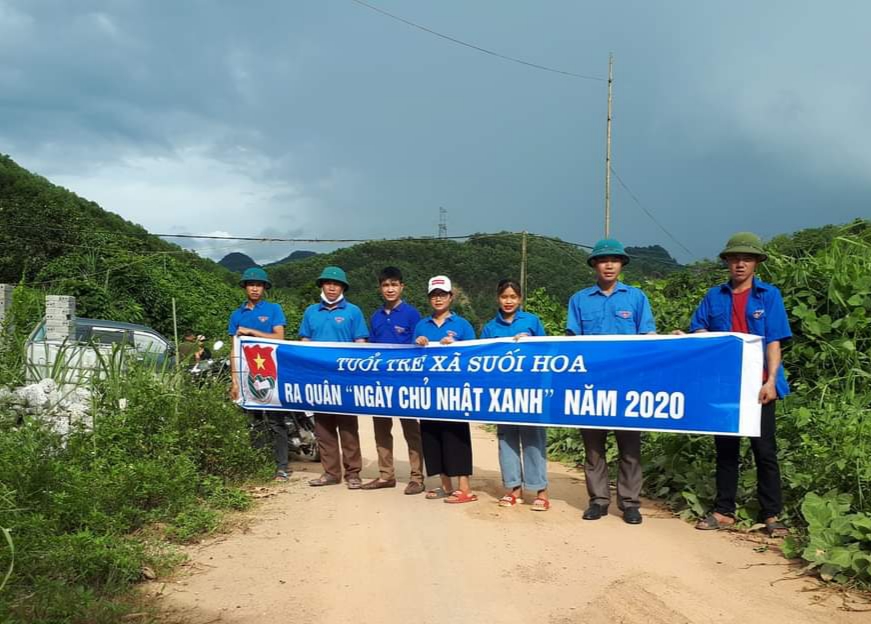
(HBO) – Hoa Binh province has given a facelift to rural areas, improved local livelihoods, and reduced poverty rate thanks to implementation of the provincial Party Committee’s Resolution 16 dated August 11, 2017 on enhancing leadership in carrying out the national target programme on sustainable poverty reduction by 2020 with a vision to 2030.
 The
youths in Suoi Hoa commune, Tan Lac district launch the "Green Sunday” campaign
– a voluntary activity in underprivileged areas.
The
youths in Suoi Hoa commune, Tan Lac district launch the "Green Sunday” campaign
– a voluntary activity in underprivileged areas.
With specific policies, the province attained significant achievements in the
sustainable poverty reduction after three years. Due attention has been paid to
construction of essential infrastructure in difficult and particularly
difficult localities, helping the poor
get access to basic social services like accommodation, fresh water, health care,
education, and social welfare, among others.
The policies have contributed to shifting local agriculture from small-scale
production to commodity production. Besides, local famers have focused on
applying advanced technologies into cultivation, forming production chains
coupled with origin tracing of agricultural products.
The project on supporting 36 poorest villages and hamlets was integrated with Programme
135, bringing in positive results such as reducing the rate of poor and near
poor households, providing power and building roads for difficult villages, and
developing production to meet locals’ demand.
Particularly, the poverty rate has been cut 3.6 percent per year on average,
forecast to stand at 8.56 percent by the end of this year./.
The Standing Board of the Hoa Binh provincial Party Committee has agreed in principle on a proposal by the Standing Board of the Party Committee of Hoa Binh city to gather feedback on the city’s 1:2000 zoning plan, which forms part of its broader urban development strategy.
Hoa Binh province has made notable progress in public administration reform and digital government development, with the satisfaction index among citizens and businesses reaching over 84%, according to recent government evaluations.
Thanks to great efforts by local authorities in recent times, the governance and public administration performance of Mai Chau district has been significantly improved.
In the afternoon of June 6, the Party Committee, the People's Council, the People's Committee and the Fatherland Front of Lac Son district solemnly held a meeting to celebrate the 139th anniversary of the district's founding (1886–2025) and the 79th anniversary of the establishment of the district's Party Committee (1946–2025). There was the attendance of Mr. Bui Van Thang, the Vice Chairman of the Provincial People's Council; Mr. Quach Tat Liem, the Vice Chairman of the Provincial People's Committee; Ms. Dang Bich Ngoc, the Deputy Head of the National Assembly Delegation of the province; as well as the former leaders of the province and district through various periods, who are the natives of the district.
Implementing the Politburo’s Resolution No. 57-NQ/TW on breakthroughs in science – technology, innovation, and digital transformation is a golden opportunity for the northern mountainous province of Hoa Binh to renew growth model, improve competitive edge and shorten digital gap.
Resolution 57-NQ/TW, issued by the Politburo on December 22, 2024, identifies sci-tech, innovation, and digital transformation as strategic breakthroughs to build a developed and prosperous nation. In Hoa Binh province, this spirit is not just a slogan, it’s being put into action through concrete initiatives that form a "new development triangle”: digital citizenship, digital economy, and digital administration.



 The
youths in Suoi Hoa commune, Tan Lac district launch the "Green Sunday” campaign
– a voluntary activity in underprivileged areas.
The
youths in Suoi Hoa commune, Tan Lac district launch the "Green Sunday” campaign
– a voluntary activity in underprivileged areas.